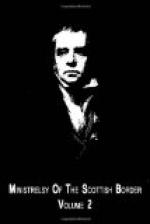His brethren him graunt alle his
bone.
He let him shrive swithe sone,
To make his soule fair and cleue,
To for our leuedi heven queen,
That sche schuld for him be,
To for her son in trinite.
Dansimond zede and gadred frut,
For sothe were plommes white,
The steles[B] he puld out everichon,
Puisoun he dede therin anon,
And sett the steles al ogen,
That the gile schuld nought be sen.
He dede hem in a coupe of gold,
And went to the kinges bord;
On knes he him sett,
The king full fair he grett;
“Sir,” he said, “by
Seynt Austin,
This is front of our garden,
And gif that your wil be,
Assayet herof after me.”
Dansimoud ete frut, on and on,
And al tho other ete King Jon;
The monke aros, and went his way,
God gif his soule wel gode day;
He gaf King Jon ther his puisoun,
Himself had that ilk doun,
He dede, it is nouther for mirthe ne ond,
Bot for to save al Iuglond.
The King Jon sate at mete,
His wombe to wex grete;
He swore his oth, per la croyde,
His wombe wald brest a thre;
He wald have risen fram the bord,
Ac he spake never more word;
Thus ended his time,
Y wis he had an evel fine.
[Footnote A: Hope, for think.]
[Footnote B: Steles—Stalks.]
Shakespeare, from such old chronicles, has drawn his authority for the last fine scene in King John. But he probably had it from Caxton, who uses nearly the words of the prose chronicle. Hemingford tells the same tale with the metrical historian. It is certain, that John increased the flux, of which he died, by the intemperate use of peaches and of ale, which may have given rise to the story of the poison.—See MATTHEW PARIS.
To return to the ballad: there is a very similar song, in which, apparently to excite greater interest in the nursery, the handsome young hunter is exchanged for a little child, poisoned by a false step-mother.
LORD RANDAL.
“O where hae ye been, Lord Randal,
my son?
“O where hae ye been, my handsome
young man?”
“I hae been to the wild wood; mother,
make my bed soon,
“For I’m weary wi’ hunting,
and fain wald lie down.”
“Where gat ye your dinner, Lord
Randal, my son?
“Where gat ye your dinner, my handsome
young man?”
“I din’d wi’ my true-love;
mother, make my bed soon,
“For I’m weary wi’ hunting,
and fain wald lie down.”
“What gat ye to your dinner, Lord
Randal, my son?.
“What gat ye to your dinner, my
handsome young man?”
“I gat eels boil’d in broo’;
mother, make my bed soon,
“For I’m weary wi’ hunting,
and fain wald lie down.”
“What became of your bloodhounds,
Lord Randal, my son?
“What became of your bloodhounds,
my handsome young man?”
“O they swell’d and they died;
mother, make my bed soon,
“For I’m weary wi’ hunting,
and fain wald lie down.”




